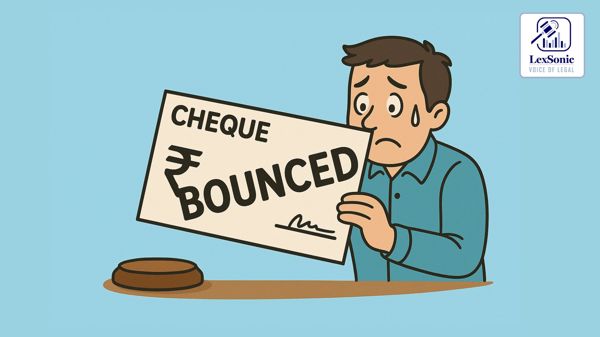Supreme Court Sets Aside Acquittal in Cheque Bounce Case: Upholds Trial Court’s Verdict.
13 August 2024
Criminal Appeals & Suspension of Sentence >> Criminal Law | Negotiable Instruments Act >> Criminal Law
The Supreme Court of India recently intervened in a significant cheque bounce case of Sri Sujies Benefit Funds Limited v/s M. Jaganathuan, overturning a decision by the Appellate Court and High Court that had acquitted the accused. The case originated from a dispute involving a chit fund company and a borrower who had defaulted on several loan repayments.
Case Details:
The dispute involves a chit fund company (the appellant) and the sole respondent (the accused), who had borrowed a substantial amount over two years, culminating in a debt of ?21,09,000. The loans were provided in various installments, and to partially settle this amount, the accused issued a cheque for ?19,00,000 on February 3, 2003. When the cheque was presented, it was returned due to the account being closed. A statutory notice was issued by the complainant, which the accused responded to by denying the debt. Subsequently, the complainant filed a criminal case under Section 138 of the Negotiable Instruments Act, 1881 (N.I. Act) before the Judicial Magistrate Court in Coimbatore.

Trial Court Proceedings:
The Trial Court convicted the accused, sentencing him to one year of simple imprisonment and a fine of ?38,00,000. The judgment was based on the premise that the cheque was issued to cover a legally enforceable debt. The court considered the evidence presented by the complainant, including testimony and documents, and concluded that the cheque was dishonored due to insufficient funds.
Appeal and Additional Evidence:
The accused appealed the conviction, and the Appellate Court allowed the introduction of additional evidence under Section 391 of the Code of Criminal Procedure. This evidence suggested discrepancies in the rate of interest applied to the loans, leading the Appellate Court to acquit the accused. The High Court upheld the acquittal, rejecting the complainant’s appeal.
Supreme Court’s Ruling:
The Supreme Court scrutinized the findings of the lower courts and determined that the acquittal was based on an erroneous interpretation of the evidence and legal principles. The Court emphasized that once the issuance of the cheque was established, a presumption under Sections 138, 139, and 118(a) of the N.I. Act arose, which the accused failed to rebut effectively.
The Supreme Court observed that discrepancies regarding the rate of interest were insufficient to disprove the existence of a legally enforceable debt. The Court noted that the principal amount in the cheque was undisputed, and any differences in interest rates, whether 1.8% or 3%, did not negate the legitimacy of the cheque’s value. The Court also criticized the Appellate Court's reliance on the Tamil Nadu Prohibition of Charging Exorbitant Interest Act, 2003, to justify the acquittal. It ruled that any objections to interest rates should have been addressed through appropriate legal channels rather than in a cheque bounce case.
Final Judgment:
The Supreme Court overturned the Appellate Court’s and High Court’s decisions, reinstating the Trial Court’s judgment with modifications. The Court directed the respondent to pay a fine of ?28,50,000, which is one and a half times the cheque amount. The sentence of imprisonment was waived due to the respondent’s advanced age, but the fine must be paid within eight months. Failure to comply would result in the revival of the imprisonment sentence.
Conclusion:
This judgment underscores the importance of adhering to legal procedures and the necessity of presenting clear evidence to dispute claims under the N.I. Act. It also highlights the Supreme Court’s role in ensuring that justice is served by rectifying errors in the lower courts' judgments.
Negotiable Instruments Act, 1881
